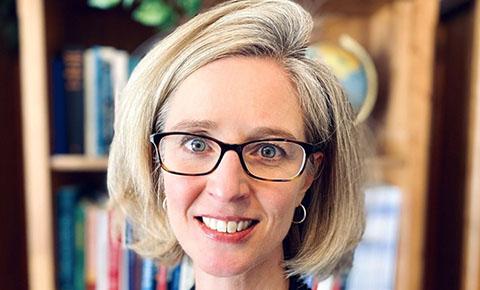We Need International Education More Than Ever. Can It Be Saved?

The concept of “mobility” or moving freely across borders must be dramatically redefined to strengthen global education, School of Education and Social Policy alumna Kara Godwin (MS05) said during a recent Northwestern University webinar.
“International studies is more than mobility – it’s a mindset,” said Godwin, director of internationalization for the American Council on Education, which recently released a new Model for Comprehensive Internationalization.
“It’s studying abroad. Conducting research abroad. But it’s also finding opportunities for students who cannot go abroad or who cannot come here, about supporting international students pre- and post- graduation, and Reimagining learners as not just undergraduates but everyone on campus,” said Godwin, who received her master’s in SESP’s Higher Education Administration and Policy Program (MSHE.)
The virtual event was sponsored by the Office of International Relations which facilitates a variety of programming through its One World\One Northwestern initiative, intended to encourage sharing and collaboration across the University. Kim Rapp, assistant vice president for international relations and MSHE faculty member, arranged for Godwin to return to the Northwestern community.
Citing four years of upheaval in international education-including travel bans, visa issues, and a global pandemic that shuttered borders and temporarily suspended programming–Godwin stressed that reframing our concept of mobility will help advance equity initiatives.
She also highlighted three common myths of international education.
- It’s “education abroad.” Study abroad is certainly part of international education. But it’s also a privilege. Globally, less than 2% of undergraduate students study abroad.
- It’s all about “international” students. Having international students on campus doesn’t necessarily automatically translate into intercultural learning for the domestic students or for the international students. In fact, a more “inclusive and human centered” view of international students is needed for student success.
- Internationalization is only about other countries. “Leveraging diversity in all forms in the classrooms, among colleges, and in local communities is absolutely crucial for thinking about globalization and internationalization” she said. “We can’t just think about crossing borders.”
“If only students who study abroad are able to engage in a global space, we will never reach an equitable opportunity for our graduates and certainly not for the kind of workforce development that we need to be doing in the current century,” she said.
Giving faculty and staff more developmental opportunities is an important first step, Godwin said, since newly-minted and veteran PhDs aren’t always equipped with the intercultural competence that they need to teach and lead the way forward.
Fortunately, increasing numbers of institutions are picking up on the Collaborative Online International Learning (COIL) movement that has been building for two decades, she said. “We’re seeing significant opportunities for students who might not otherwise need to or be able to study abroad.”
A Pell Grant recipient and first-generation college graduate, Godwin earned her doctorate in comparative and international education from Boston College. Her previous experience includes global consulting and research on internationalization for governments, NGOs, and higher education institutions.
She holds a research fellow position at the Boston College Center for International Higher Education and, at the American Council on Education, leads the Internationalization Laboratory, which helps institutions around the world develop and implement strategic plans for globalization.
Godwin is especially interested in the global development of interdisciplinary and liberal arts education and has published broadly on analysis of the Global Liberal Education Inventory, a database of over 200 programs worldwide.
Before joining The American Council on Education in 2019, she worked at Northwestern University and the University of Chicago and was a visiting scholar at Amsterdam University College, and an education policy analyst in the US. In her former career, she was an information technology project manager in the US and UK.
Mobility, she said, isn’t just having international students come to the US. It also involves “the power dynamics that happen, and ethical considerations that need to take place when we think about mobility in a global space,” she said.
Next month, the American Council on Education will release the survey for its next iteration of the longitudinal study, Mapping Internationalization on U.S. Campuses. It assesses the current state of internationalization at American colleges and universities, analyzes progress and trends over time, and identifies future priorities.
The report, released every five years, is the only comprehensive source of data and analysis on internationalization in U.S. higher education, and includes two- and four-year, public and private, degree-granting institutions.